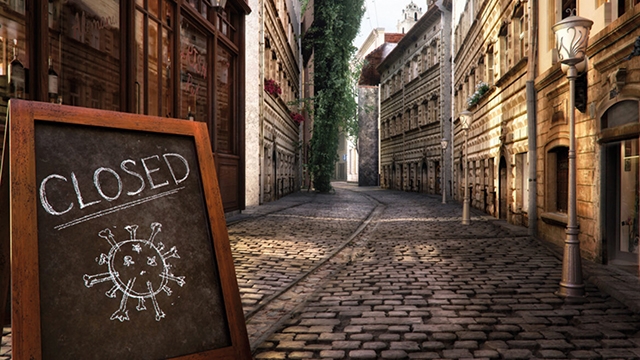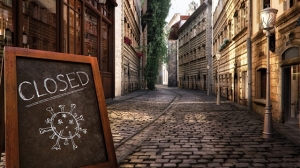Quarantine or Commerce? The Economic Consequences of Counter-Pandemic Tunnel Vision
Op-Ed
As the nation moves into the grey chill of December, the redeeming joys of gathering with friends and family in a warm restaurant or bar are all but a faded memory. Heavy-handed mandates by the government have closed retail outlets, gathering places, and any respite from the doldrums of winter have been ripped from the people’s hands. While this is an immense hit on the social life of many, the true casualties are the small businesses that are forced to go to ground. Especially since these restrictions are set to be in force through the holiday season, one of the more economically robust periods of the year.
Where normally tourists and local residents alike are out dining, shopping, and generally driving the consumer end of the economy, this fiscal year, it will be frozen. While the government refuses to label it a “lockdown”, there are few other words to describe the draconian measures being taken against a virus with an extremely low kill ratio. A virus with a 99.1% survival rate among those who contract it, and a statistically 3.84% chance of even being contracted, should not have the control over the country that it does.
The government action is claimed to be backed by science and medical perspectives. However, this is a monochromatic way of looking at things. The economic, social, and security voices have largely been left unheard.
Economically, Georgia is already bleeding from the first battle with restrictions. With a new round of restrictions comes a new round of victims. In the first 10 months of 2020, the Georgian economy has shrunk 5.1%. While a small number on the surface, this is massive for an economy already fighting for every fraction of growth percentage. With the announcement of more restrictions in November, experts are painting a worrisome picture for the future.
This impending collapse of the small business machine that underpins much of the local microeconomics in the large cities is like a rot in the walls. While it may not be seen so clearly now, it will slowly eat away at the structure of the nation. In addition, the loss of livelihoods for the people that own and work in these business will be the catalyst for a social shift.
This social shift, some of which is already being seen, has the potential to be a slippery slope backwards for the country. Many Georgians still remember the socio-economic strife of the 1990s, and with due fear would never wish its return. While this is still a fair way off in the future, it is shifts like we are seeing now that are the first rumblings of its return. The recent string of high-profile robberies is a stark contrast to the calm of the past years. In the first day of December, a hospital meant for the treatment of COVID patients was robbed at gunpoint.
This uptick in crime is only the tip of the incoming iceberg that further restrictions and their harsh enforcement will bring. As people are left with few other options, many will return to the ways that they know will bring them income. In addition, violent crime, drug use and alcoholism will begin to set in. People stuck at home, with little motivation and no work, are more likely to resort to alternative means of respite. While there has been a small drug-fueled underworld in Tbilisi for some time, this has largely been kept in strict check by local law enforcement. Now, this will start to grow its influence, with more users turning to its euphoric allure.
This expansion of the criminal world stands to make life increasing harder for local authorities to provide the quality of life and stability to which many have become accustomed. The increased efforts to curb this expansion by the government will mean more restrictions and more heavy-handed efforts against the people. In return, the people will defy orders and respond with more violent crime, eventually turning on their local law enforcement and government representatives. The future snowball effect of this exchange is bleak.
While the intentions of the government restrictions may be well placed, they are off center when it comes to their effectiveness. Curfews are widely viewed as an unnecessary and misguided attempt to stop movement, as if a virus is set to a timer and only works a graveyard shift. Mandatory mask-wearing in open public spaces where the effectiveness is virtually nil, and forcing people to wear something that is largely a cosmetic representation of your adherence to regulations is something many would have thought to be something out of a dystopian novel.
The government’s willingness to turn their back on the economic lifelines that fuel the very country they say they are sworn to protect is disheartening. While they attempt to look through the eyes of the medical professional, they ignore the economist, the shopkeeper, the worker, and even the local policeman just trying to keep his childhood district safe from crime. The restrictions and their furtherance are an advancement of a line of rhetoric that only the fiscally illiterate and socio-economically inept would pursue. The best case scenario is to embrace smart and safe practices, and continue to let the economy, the free market, and the strength of the Georgian people, overcome this “pandemic.” The Kartli people of the mountains have weathered far worse, and this foreign invader will not be any exception.
By Michael Godwin
Image source: Shutterstock.com











